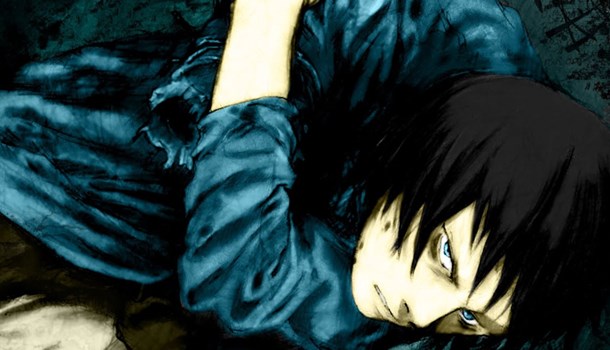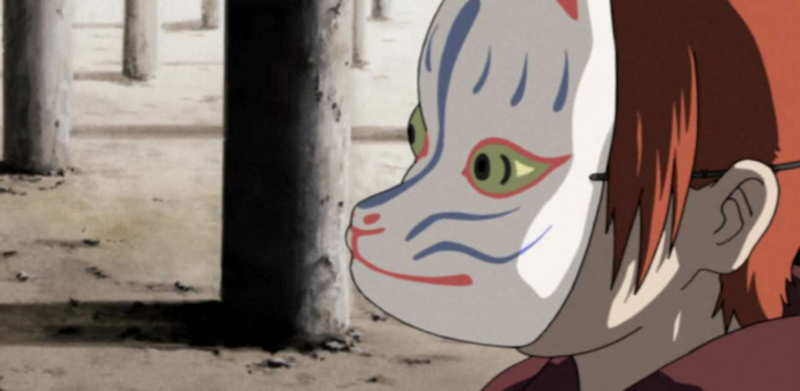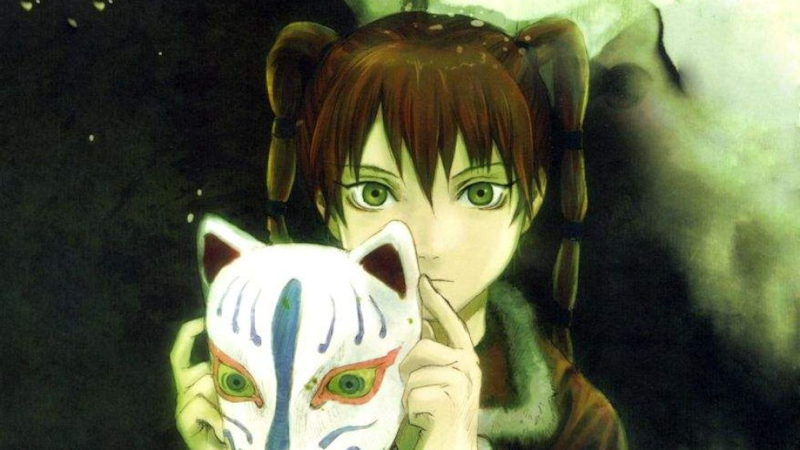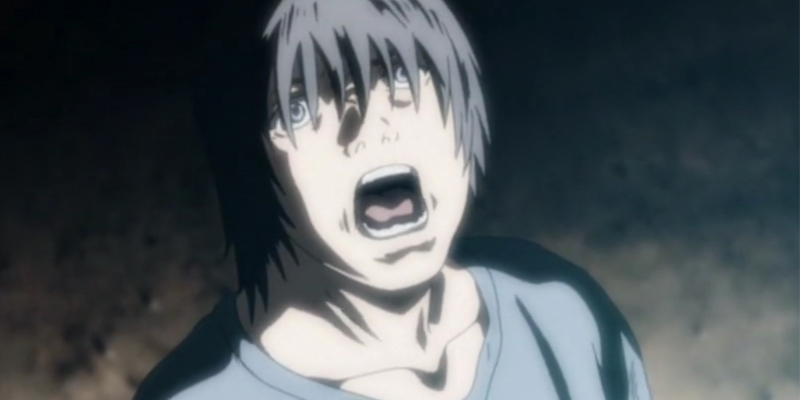
Written by Richard Durrance on 11 Jan 2021
Spoilers will come as standard. Thank you. Now please read on, should you be so generous as to spare me your time.
Having started and potentially abandoned a piece on anime of yesteryear (though depending on point of view perhaps not that yester…), I started pondering those series that deserve better – where is the brand spanking blu-ray of so-and-so, and, more to the point, why are they not up there with the Evangelions of this world? Where, even if you don’t much care for them, you recognise that they are one-offs, truly unique and somehow so much more than the sum of their parts. My head pondered a few, and one series kept recurring.
That anime was Texhnolyze, a series that originally aired in 2003. Though never an easy watch (see the review on the site for part 1 and part 2 of the eventual six DVDs, and yeah they are not positive – but that’s the nature of the series).
Vague repetition of previous statements and then some. Oh, and some Texhnolyze…
Now let’s get something straight. I’m a dilettante in so many ways – most likely the truth of the matter is most folk reading this know more about anime than I do (I bet I beat you on Mary Pickford films though) but I’ve been in and out of watching it since Manga first started putting out titles and Channel 4 showed odds and sods on a Saturday night. But none of my friends really watch anime or have heard much about it, beyond the occasional highlight such as a Studio Ghibli film, Ghost in the Shell or Akira. Subsequently I’ve mainly plotted my own course, fated by the winds of whatever I find, and at times in life, what I could afford. And back in them thar bygone days, a 20-odd episode anime series came on 7 or 8 DVDs… so, one ran out of cash to buy things rather quickly, and since I’m an inveterate film buyer that cash has to be spread around.
So I thought a lot about what to buy, (does anyone else remember Gilgamesh?) At the time, and even now, Texhnolyze stood out as something special.

Watchoo lookin' at?
Whilst I suspect many people who have seen this who may well hate its very guts, for me it’s the prime example of how and why anime exists. It also defines what to me is a gaping hole in what is generally released.
Why? Because it’s very fucking brilliant and very fucking difficult. (There that’s my swear quota used for today but used for effect not gratuitously. Mostly.)
Immediately, there’s a problem with that statement. “Difficult” tends to suggests that those of us who like Texhnolyze are somehow superior because we’ve dealt with a difficult text (let’s be all film studies about it, call it a text) and we and feel good about it. In watching and appreciating it we’ve beaten Texhnolyze! Go us! Like listening to a particularly atonal piece of classical music or avant-garde jazz – somehow the statement suggests that appreciation is an achievement.
Not so Texhnolyze. Or, rather, that isn’t what I mean by difficult.
I shall now attempt to describe my statement and will be doomed to failure – but if nothing else, I’d suggest finding the series out and trying to make up your own mind. And if you go no further in this retrospective, know Texhnolyze has an episode that functions as an homage to American painter Edward Hopper. And in a way that doesn’t just use his images, it uses them for a reason – not like the credits to Elfen Lied that riff off Klimt’s paintings of women – Texhnolyze’s use of Hopper feels profoundly purposeful and yes, downright artistic. But I’m getting ahead of myself (no surprises there). Back on track we go.
So why is Texhnolyze so difficult? It’s not hard to say why but I hesitate because it can sound extremely negative. Many of the characters are difficult to like, they can be too passive, the story is dense and not always easy to pick apart. It’s kinky, it’s perverse, the ending is baffling and it is not a happy series. At times it makes the more unhappy parts of Evangelion seem like comedy.
A belief in the visual
It’s worth taking some time to consider Texhnolyze’s first episode. The first half has almost no dialogue. It’s told in a series of images, with people we don’t know, but all the time setting up the main characters, their respective personalities and the time and place. It’s almost stiflingly claustrophobic and so atmospheric you can choke. And all through it is a tone – even when in a glossy room – of a world that seems morally dingy, where the wrong word will lose you a limb (literally) or two (again, literally). Yet it has a fascination to it, almost a grim beauty. You feel like you are genuinely in a work of art, and there is both heart and soul in this. It’s not some people putting together an "also-ran" series, but something that feels deeply personal and deeply necessary for them to say. It draws you (read: me) in, though you are slightly disconnected to the action: who are these people? What is the significance of their actions? You can feel that there is a real direction behind what you are watching, the creators know what is happening but they are only feeding us scraps of information: just enough to keep us going, just enough to keep us watching. But you find yourself questioning everything you see, and sometimes raging with or even against the rash acts of our characters, including the person we assume will be our protagonist.
It gives away so very little and this is something that will be continued throughout. Yes, characters do talk – though our eventual protagonist, Ichise, is a man of very, very few words. Rather, Texhnolyze gives away the absolute minimum at all times. And I love that – as I am sure is already obvious – because Texhnolyze is not interested in you understanding every small thing. So it’s against the grain of the traditional opening exposition, treating you instead as an adult; and yes, this series is definitely pitched more towards an adult audience.
What is that you say? I’ve not even told you what the series is about, despite all these paltry words?
You know what? I’m not sure I want to. In part because the plot is like most plots – summarised it sounds like so many other series and yet it’s the nuances that makes series Y stand out from series X and Z.
But I concede, so here I go… just to contextualise, you understand.
The Plot
Deep below the surface, the city of Lux exists to mine Raffia, a necessary element for the act of texhnolyzation – the art of creating artificial limbs. Overseen by the Organo, a yakuza-like organisation, Lux is not a happy place, a city of perpetual violence. Lux wants a spectacle and the anti- Texhnolyze faction: the Salvation Union are oft happy to oblige, as are the Raccan, a gang of disaffected youths. Into this mix lands Ichise, a prize-fighter left for dead by his promoter, the prophetic, masked girl, Ran and the Sage of Gabe, a group of respected figures protected by the Organo. And descending from the earth above, Yoshii; he may be a sinner or a saint or an agent of chaos. And lastly Doc, she of the Class, who is experimenting with a new generation of texhnolyzed limbs and who is in a position to save Ichise’s life, not that he seems to want saving.
Lux is a melting pot boiling over, and Yoshii brings the first spark that the Class will kindle.
Nothing is going to end well.
The Apathy and the Agony
Texhnolyze is the third of three series involving Yoshitoshi Abe, the first being Serial Experiments Lain, the second Haibane Renmei. Each is, in it's own way, slightly unknowable. Texhnolyze takes this to the extreme. If anything it’s a howl of grief at humanity’s eventual end and capability for destructiveness. Haibane Renmei is full of warmth. Lain is mysterious and often impersonal. Texhnolyze ranges between apathy, agony and eviscerating, misdirected rage.
The opening episode illustrates how prize-fighter, Ichise, seems not to be interested in living. Not that he wants to die, but there’s a sense that living holds nothing for him, and understandably so. He’s a commodity: the raffia miners and the working classes bay and cheer as he beats his opponents and is himself beaten. Wealthy women objectify Ichise as a sexual creature and use him as such. He has nothing personal left to him but a small glass container that supposedly contains his mother’s DNA (something I always assumed was the equivalent of being given a funeral urn, in the world of Lux). So Ichise has no place in the world as a person, he only exists to be used by those that work and those that exploit those that work. Cheery, no. But this is the world of Lux.
And then there is Lux itself. Lux exists as a force. Lux, or as the inhabitants know it, simply "The City", talks to Onishi, the texhnolyzed head of the Organo. Not that we hear it, but Onishi does.
Onishi saves Ichise's, after the young man becomes enraged with one of the women attempting to use him for sex and attempts to attack her, only to lose and an arm and a leg in the process. Onishi orders Doc to save the Ichise, and she immediately seems different to everyone else. She seems to live just outside yet within Lux (it’s never fully clear except that it is within the boundaries of Lux and very clearly separate). Her home, her lab, is clean, technologically more advanced than the dirty, grim streets of Lux and even the offices of the Organo by contrast seem quaintly old-fashioned compared to Doc’s high technology home. Not that Ichise is happy to suddenly find himself as Doc’s guinea pig, with new texhnolyzed arm and leg, though he could not otherwise hope to ever afford such luxuries and he rages, rejecting them. Until he finds a place in the Organo.
This is the beginning of the story, so let's move away from the episodic replay and explore the inhabitants of the series to give you a flavour of the show itself.
Ichise, Onishi and Doc I’ve introduced (slightly), also mentioned is Yoshii, the stranger from the surface world above about whom we know little. We see him descending, and his firing up of a portable gas stove and his initial wearing of a gas mask allow us to recognise this is no small journey, but something significant and rarely, if ever, done. Initially, too, he enters, and protects the Sage of Gabe. The Sage seems to be the spiritual heartland of Lux and has its own cult figure in the shape of young Ran, a prophetess who wears a cat-mask. And so Yoshii begins as a good person, but quickly descends into an agent of chaos, perhaps listening to The City, and sets up a spectacle that pits the Organo against Raccan against the Salvation Union.

The mysterious Ran
Ran appears as a mysterious figure, friend to both Yoshii and Ichise, and one who seems unwilling to face the possible prophecies in her mind’s eye. (You suspect her mask is symbolic of unwillingness to face the ugly truths and violence to come – as well as being ceremonial and a symbol of belonging to a group – like wearing a religious icon.)
Leader of the Raccan, Shinji, if anything is a wannabe Onishi, and like Onishi is a rare figure who is actually honourable. Like Onishi, he is somewhat detached from those he leads while being fiercely protective of them. Unlike Onishi he is an outsider (in the general sense, not a new-comer to Lux).
Depth of Character
There are other key characters who are minor players too, not just from the perspective of story but in terms of how characterisations are built. Onishi, though married, has a separate relationship with his assistant, Michiko, who seems as much a lover, carer and protector as she is a simple assistant. In one episode. Onishi makes a statement to members of the Organo by punishing them with dismemberment, but it is Michiko who does the bloody work, just as she might - in a hail of bullets - urgently yet calmly come to Onishi’s rescue. She is about the most competent and honest character in the whole series.
While peripheral, her relationship with Onishi seems to be one of respect, and yet this character building seems to be outside of the main story, but it is no less important to the overall arc and what they mean to the world they inhabit, Despite the awful circumstances on screen, it marks both as mutually affectionate, people who matter to each other and it’s something that could easily have been neglected. Yet as depicted, provides quiet humanity for all the lack of it elsewhere, in so many actions leading up to these (nameless, you’ll notice) events. Also, when we see Michiko doing her bloody work it’s noticeable how that though there is a real violence to it, it is never gratuitous; there is no sense that the series is revelling in the violence and the focus is on her, not the chopping and hacking; it’s just showing you it as it is, Lux style.
Onishi and Shinji are two sides of the same coin, only one is on the inside of what rules the City while the other is very much outside this power structure. Watching Shinji develop as a character, attracted to the stranger Yoshii, and disinterested in becoming part of the destructive forces that shatter the City, you can see how in another time, Shinji would start to move away from the Raccan, and become part of ruling class. Not for power of it, but like Onishi, as an almost benign bureaucrat capable of violence when needed. Because that’s just how Lux seems to work. The rest of the Raccan are more interested in youthful chaos and hanging out, but Shinji seems to have dreams, a desire for something more than hanging out in their bar and chatting up girls.
Yet many characters are in some ways cyphers, perhaps most specifically Ichise. He’s not quite passive (except when raging) but often seems almost an observer of The City. The series uses him as point of view character to show what Lux is and what it will be. And then the world above.
Defining the World
The world above? Yes, and what about the Class, or whatever they are?
Our first introduction to the Class is simply Doc, with her techie home, simple meals and very obvious desires for Ichise. In some ways her initial desire mirrors the first scene where a wealthy woman uses Ichise for sex. When Ichise is first being texhnolyzed, Doc is very obviously sexually excited by this, though how much is Ichise and how much is the texhnolyzed Ichise is hard to say. As Doc’s character develops she could easily be the pervy doctor leching on the young man, but her ultimate desire is the next generation of texhnolyzation, and Ichise is her proof of concept. And yet we learn little of The Class from Doc, just as we learn little of the world above from Yoshii, beyond their existance and relationship to Lux.
We do visit both the Class and the surface and it would be easy to look at them in terms of class (note lower case “c”). The Class seem to be the crazed royals, the out of control wealthy seeing everyone else (the Class included) as their playthings; the surface world is a grey abstract bureaucracy meant to reflect a view of the middle class, and Lux is the toiling, roiling working masses waiting to rise up.
Neither Class nor the surface intrudes at first until it begins to become clear that Lux is crumbling. But unlike Lang’s great city in Metropolis, there is no bargain to be struck: no hand that meets the heart, ready to rejuvenate itself: Lux, the Class, the Surface, all are dead and or dying: vestiges of a world that has no purpose; it’s way is well and truly lost. Most of what is left are passions - and most of those downright perverse and disturbing.
So again, bloody depressing.
More than a feeling
Like I said, Texhnolyze won’t make you whoop for happiness. It’s grim, but not excessively so and it treats the audience as adults. Often this appears in passing and with how the inhabitants are willing to deal with disturbing issues: the son who is sexually abused by his father (accepting it as a quid pro quo for what he wants) and that statement, writing it, could and should be distasteful but as with all series, all films or text it’s how it is dealt with that matters: this isn’t nice, and the series hints at the history of the characters in this context and it’s neither salacious nor is it vulgar (thankfully absent is the ever-present anime lecher – male or female – with the lazy lolling tongue trope) but presented as matter of fact and yes, you sense the characters’ emotions under the surface: disturbed passion, disgust, anger and so much more. It happens but doesn’t rub your face in it. To me that’s the essence of much of Texhnolyze: yes, Doc may fancy the pants and loll over Ichise at times but it never ventures into the gratuitous, rather it’s pushing you into a disturbed world and many people within are disturbed, including almost all our protagonists.
And for that reason I don’t find it depressing but instead challenging, because it doesn’t always give you all the facts. It can present you with various forms of madness and characters running away from responsibility (like Ran who doesn’t want to see her visions for people who will do or cause terrible things). And as I mentioned, there is a sense of artistry about Texhnolyze. It won’t necessarily make you happy but it will make you think.
Which takes me back to the artist, Edward Hopper. When Texhnolyze begins to paint the world as Hopper’s paintings, the use of Hopper’s images of isolated souls (that Texhnolyze synthesises as Doc and others) descend into loss feels right and is beautifully done. It’s easy to take iconic images and rip them off, but Texhnolyze presents them as a kindred spirit, showing loss in a world that otherwise is living or should be living. And it changes the tone somewhat, from the chaotic outer violence to inner feelings, with the images illustrating feelings. It doesn't matter if you haven’t a clue who Hopper is or where the images are derived from because the power of these images stand on their own. That’s the beauty of it, you don’t need to be in on the reference for it to matter; the images and the feelings they evoke are universal.

This is your brain on Texhnolyze
The lasting impact
One thing that I find intriguing about Texhnolyze is that if you ask me to list my ten favourite anime it probably wouldn’t be on the list. Yet I feel compelled to write about it because of what it represents. That mid-2000s period when (in my experience) there were series that were not just your same old same old tropes. Like watching Noir, one of my first truly formative anime experiences, and not realising most other girls-with-guns series were not of the same genre busting ilk, but fan-service panty flash titillation (or maybe I had bad luck after watching Noir). I’d watched and loved Haibane Renmei, Ergo Proxy strived for something that it couldn't quite reach and even Black Lagoon worked best when at its darkest.
I’m sure the same is true now, these series are still being made (in many ways The Promised Neverland fits the bill and to a certain extent The Rising of the Shield Hero) but I struggle to dig them out. So why am I making such a Big Deal Out Of This? (Victorian capitalisation for emphasis). I think the answer is simple and two-fold. Firstly, a lot of anime we see in the west is curated by Western distributors and that limits our concept of what anime is; secondly, that means that the series we don't see, those that might convert a wider audience and grow into more interesting niches, could be left behind simply because there's no perceived audience for them. A thing can only be seen to be popular if it is in fact seen and appreciated by the audience. The lack of alternative exposure simply leads to another hundred isekai series being released because that's all that seems to be available or demanded. It's a case of supply both leading to and limiting demand.
This is something I touched on writing my comparison of Angel Beats and Haibaine Renmei - ensuring that those series are made available widens the concept of what anime can be, and that matters. Texhnolyze similarly broadens horizons and is similarly important.
You get the (laboured) point.
Or maybe I’m on the wrong track but I know at one point I may have veered away from watching more anime, and series like Texhnolyze kept me on course. Even if not in my top 10.
Also the opening titles, with the edit of a track by Juno Reactor, is bloody excellent. It’s the best title sequence ever. What more do you want?

Long-time anime dilettante and general lover of cinema. Obsessive re-watcher of 'stuff'. Has issues with dubs. Will go off on tangents about other things that no one else cares about but is sadly passionate about. (Also, parentheses come as standard.) Looks curiously like Jo Shishido, hamster cheeks and all.
posted by Ross Liversidge on 26 Mar 2025
posted by on 21 Mar 2025
posted by Ross Liversidge on 21 Mar 2025
posted by on 10 Mar 2025
posted by Ross Liversidge on 04 Mar 2025
posted by Richard Durrance on 27 Feb 2025
posted by Ross Liversidge on 23 Feb 2025